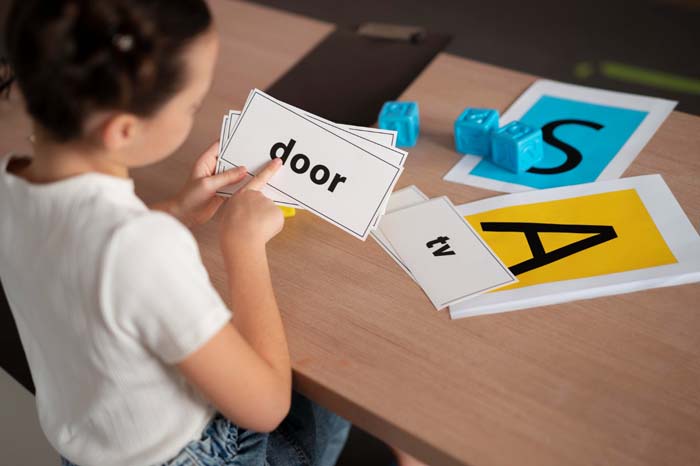Literacy development begins when children join preschool and continues throughout their time there.
Preschool literacy activities aim to develop these skills in a fun and interactive way. Literacy for preschoolers is important! There is no debate about that as it lays a the base for language and communication skills. Both these skills are essential for academic and professional success in life. By exposing children to a variety of literacy activities, parents and educators can help children develop confidence and become successful readers and writers. Like any activity that we plan for our little ones, literacy activities for preschoolers, too, must have an element of fun.
Preschool literacy activities work best when they are interactive, age-appropriate, and enjoyable. When learning feels like play, children stay curious, focused, and eager to participate. Through simple, hands-on activities, parents and educators can nurture a child’s love for language while strengthening essential skills such as vocabulary, phonemic awareness, comprehension, and fine motor development.
Explore the following 21 literacy activities that are easy to implement at home or in classrooms
- Alphabet hunt: Hide or scatter letters of the alphabet around the house or classroom and ask the little one to search for them. They can use letter magnets or look for letters in books, posters, or signs. This activity not only helps children learn the alphabet but also develops their vocabulary and cognitive skills as they associate each letter with a word.
- Word building: Use letter blocks or magnets to create simple words, such as cat, dog, or hat. Encourage your child to sound out each letter and blend them to form the word. This activity not only promotes the ability to recognise and manipulate individual sounds and letters but also encourages children to experiment with creating new words.
- Rhyming games: Play games that involve rhyming, such as “I Spy” or “Rhyme Time.” For example, you can say, “I spy something that rhymes with ‘cat,” and your child can guess the word “hat.” By recognising and creating rhyming words, children learn about sound patterns and how words are put together.
- Letter matching: Cut out letters from magazines or newspapers and ask your child to match them to a corresponding letter on a chart or board. By participating in letter-matching games, preschoolers can develop their visual discrimination skills, improve their memory retention, and enhance their fine motor skills.
- Storytelling: Encourage your child to tell a story using picture books or their imagination. Ask questions and prompt them to add more details to the story. By sharing stories with children, parents and educators can help foster their imagination, develop their language and communication skills, and encourage critical thinking.
- Puppet show: Puppet shows are an excellent way to engage children and foster their imagination, creativity, and language skills. Use puppets to act out a story or create a new one. Encourage your child to use different voices for each character.
- Sight-word bingo: The game involves matching written sight words on a bingo card to spoken words called out by the teacher or parent. Create bingo cards with common sight words and call out the words for your child to mark off. Playing sight-word bingo can help preschoolers build their vocabulary, develop their memory skills, and improve their reading abilities.
- Letter tracing: This is one of the best literacy activities for preschoolers because it helps develop their writing skills while also teaching them the alphabet. Your child with letter-tracing sheets, or create your own by writing letters on a piece of paper and having your child trace over them.
- Write and draw: This activity involves providing a blank sheet of paper and asking children to draw something and then write a few sentences about it. The write and draw activity is a fun way to encourage children to use their imagination and creativity while also developing their fine motor skills.
- Letter hopscotch: Draw letters on the ground or use letter mats, and have your child hop on the letters while saying their names.
- Alphabet toss: Create a game where your child tosses a beanbag onto a mat with letters on it and says the letter that the beanbag lands on.
- Alphabet song: The song typically includes the 26 letters of the English alphabet set to a catchy tune. The song is simple and memorable. That is what makes this activity both fun and effective. Getting children to recognise the alphabet’s letters is, after all, THE most important step in developing their literary skills!
- Magnetic poetry: Use magnetic poetry sets or create your own by cutting out words from magazines or newspapers and attaching magnets to them. Encourage your child to create silly sentences or poems.
- Word scavenger hunt: Create a list of words for your child to find around the house or classroom. Provide them with a clipboard and a pencil to check off each word as they find it.
- Alphabet matching: Create cards with upper- and lower-case letters and have your child match them together. The activity involves matching letter cards, either in the form of a game or a puzzle, where children have to identify and match corresponding letters.
- Sound guessing game: To play the game, simply create or record various sounds, such as animal noises, musical instruments, or household items, and have children guess what they are. This game can help children learn to identify different sounds, develop their vocabulary, and improve their memory and attention skills.
- Word family sort: Word family sort is a literacy activity that helps preschoolers learn to recognise and group words with similar sounds and letter patterns. In this activity, children are given a set of words and asked to sort them into different groups based on their word families.
- Letter stamping: Provide your child with letter stamps and ink pads and encourage them to stamp out words or letters on a piece of paper.
- Name puzzles: These puzzles typically consist of wooden or cardboard pieces with letters that can be arranged in various combinations to spell out a child’s name. By assembling the puzzle, preschoolers can practice letter recognition, hand-eye coordination, and problem-solving skills.
- Book club: Start a book club with your child and read a book together each week. Gradually, other children and their parents could join too. These sessions could be fun, as the fun just doesn’t stop with reading out the books, but continues after it, as everyone involved discusses the story and the characters!
- Vocabulary building: Teach your child new words each week and encourage them to use them in sentences. Provide them with opportunities to practice using the words in conversations and writing.
Read More – Fun & Educational Activities for Kids
How EuroKids Supports Early Literacy Development
At EuroKids, literacy is nurtured through a well-structured, play-based curriculum that aligns with children’s developmental needs. Our approach integrates storytelling, phonics, rhymes, picture reading, conversations, and hands-on activities to make language learning natural and enjoyable.
The EuroKids curriculum is thoughtfully designed by early childhood experts and mothers, ensuring that literacy activities are introduced in multiple engaging formats throughout the year. This repetition through varied experiences helps children reinforce concepts without feeling pressured. By combining fun, interaction, and structured learning, EuroKids supports children in becoming confident communicators and early readers while fostering a lifelong love for books and language.
Read More – Best Activities for 4-Year-Old Kids
Conclusion
Literacy for preschoolers is imperative, and the responsibility lies with us to encourage children to explore! Preschool literacy activities play a crucial role in preparing children for a lifetime of learning. With these activities, you can help your child develop their all-around reading, writing, speaking, and listening skills. Especially today, when everything is digital, and screens present in nearly every room, it becomes important for us to balance screen time with offline activities for kids.
A healthy balance between online and offline activities will help them in their well-being, enhance their social connections, and encourage physical activity. Well-thought acttivities for kidscan also help them develop a sense of independence and a positive attitude towards learning. It does a world of good for their sense of self-esteem.
The EuroKids curriculum has been designed by a team of mothers and experts, and it includes various activities for children that target and enhance theiroverall development. The various activities for kids are repeated in different ways throughout the year, allowing them to keep practising what they have learned. Click here to visit a centre near you.
FAQs:
1. Why is literacy important for preschoolers?
Literacy helps preschoolers develop language, communication, thinking, and early reading skills, which are essential for academic success.
2. How can parents support literacy development at home?
Parents can read regularly, talk with children, play word games, encourage storytelling, and engage in simple literacy-based activities daily.
3. At what age should literacy activities begin?
Literacy development begins from infancy, but structured literacy activities are especially effective during preschool years.
4. How does play-based learning help with literacy?
Play-based learning keeps children engaged and motivated, making it easier for them to grasp language concepts naturally.
5. How does EuroKids promote literacy for preschoolers?
EuroKids integrates literacy into daily activities through stories, phonics, rhymes, conversations, and interactive learning, ensuring a strong foundation in language skills.
















